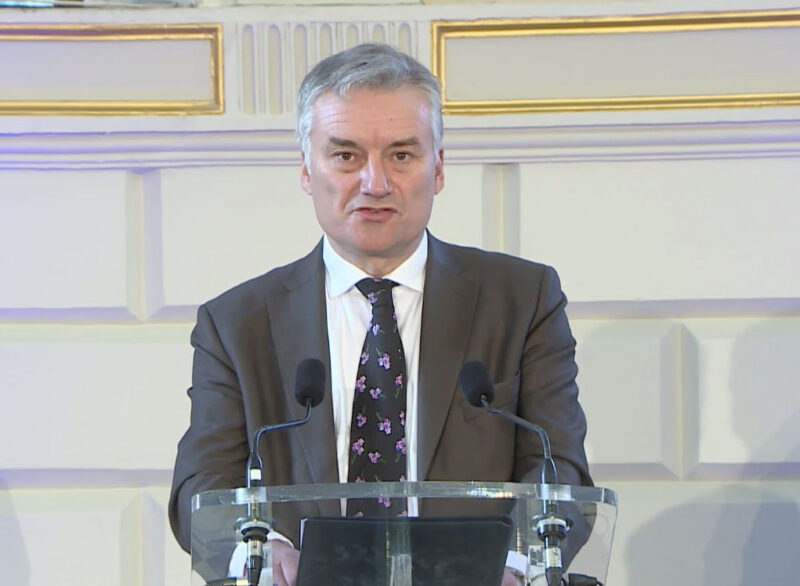The importance of education in wider society was the key takeaway point from the launch of Trinity Education – and by extension, the end of the Trinity Education Project (TEP) – in College this morning.
Speakers hammered home the four pillars of the overhauled structures of Trinity’s undergraduate teaching – independent thinking, effective communication, responsible action and continuous development.
TEP was a university-wide, radical re-imagining of how Trinity students are taught and assessed. The project began as a review of the undergraduate curriculum during the 2012/13 academic year, which included consultation with student representatives, alumni and graduate recruiting companies.
The TEP steering committee was formed in autumn 2014, and developed over the next four years a slew of new structures and practices to enhance and improve undergraduate teaching in Trinity.
In some cases, centuries-old academic structures were overhauled – the introduction of Christmas exams, for instance, marked a break from almost 400 years of tradition. These and other changes were rolled out in 2018 – not without issues, as this newspaper reported, with students experiencing “massive stress” trying to submit assignments on time and study for exams.
Speaking in a mostly empty Exam Hall, Vice-Provost Jurgen Barkhoff, who spearheaded TEP after the departure of his predecessor Chris Morash last year, said that the “ambitious project” was “rooted in the best of Trinity traditions and has its focus firmly in the future”.
Barkhoff explained the seven features of Trinity Education, which, he said, represented College’s “determination to bring out the best in our students”.
Following Barkhoff, Mariya Gabriel, the EU commissioner for innovation, research, culture, education and youth gave remote address centred on Trinity’s European footprint, saying that Trinity Education highlighted “just how tenacious your commitment to your students is”.
“Higher education would be a key tool in European recovery”, she said.
In a short, muffled address, Harris congratulated College for its work on the project, and reiterated the importance of EU-wide networks of universities: “We must all work together across our European Union and collaborate when it comes to research, when it comes to science, and when it comes to brainstorming around higher-education policy.”
Harris added that the launch “could not come at a better time”.
“Now, more than ever”, he said, “we need that Trinity value of promoting and fostering critical thinking”.
Final-year student Niamh McCay, who served as Trinity College Dublin Students’ Union (TCDSU) education officer last year, then spoke in her capacity as both an undergraduate student and a key figure in TEP’s implementation.
“As I enter into my final year, I’m really excited to see what’s ahead”, McCay said.
The opportunity that students now have to shape their own education will “bolster the academic experience”, she continued. New students “will feel a sense of ease and comfort knowing they don’t have to make all the decisions right away”.
Turning to the capstone project, McCay noted that this element of Trinity Education meant that “students are able to tie up their academic experience by working alongside some of Trinity’s best researchers”.
“It’s very important to me and to every other student that you leave College with a sense of achievement, and I think the capstone project perfectly ties up their academic experience.”
McCay also drew on her own experience in various societies and TCDSU to praise the co-curricular aspect of the project.
“I know when I leave Trinity, I’m going to look back with pride”, she concluded. “Every corner you turn, there’s a brilliant mind.”
Prendergast, the last speaker, remarked that “we believe there is nothing more important” than students’ education. “It’s often them teaching us”, he said.
As was to be expected, the circumstances of the launch were mentioned – speaking in an empty Exam Hall, donning masks except when speaking, both Barkhoff and Prendergast used the pandemic to their advantage, emphasising the importance of research and innovation to society.
“It seems poignant to be launching now, at this time when some of the key features are unavoidably compromised”, Prendergast said. “If poignant, it is also a valid and necessary time to launch the Trinity education. Precisely because it is not business as usual, the renewed and revitalised Trinity education is more important than ever.”
Prendergast, who is in his last year of term, said that TEP “may be the most important achievement” in his time as Provost.
He spoke of modern-day “incessant media and marketing campaigns” which hamper students’ abilities to think critically.
“In a rapidly changing world, a graduate should be able to grow and adapt”, he said. “We don’t want our graduates to walk out Front Gate thinking they know everything.”
“I hope they find that what they learn in college is a reservoir that they can draw upon.”







